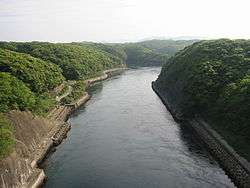| Site |
Municipality |
Comments |
Image |
Coordinates |
Type |
Ref. |
Isomaiwakage Site
磯間岩陰遺跡
Isomaiwakage iseki | Tanabe | | | 33°43′17″N 135°23′00″E / 33.72127783°N 135.3832557°E / 33.72127783; 135.3832557 (Isomaiwakage Site) | 1 | |
Shimosato Kofun
下里古墳
Shimosato kofun | Nachikatsuura | | | 33°35′03″N 135°55′22″E / 33.58415868°N 135.92264581°E / 33.58415868; 135.92264581 (Shimosato Kofun) | 1 | |
*Iwasesenzuka Kofun Cluster
岩橋千塚古墳群
Iwasesenzuka kofun-gun | Wakayama | | 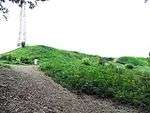 | 34°13′31″N 135°13′35″E / 34.22535457°N 135.22650145°E / 34.22535457; 135.22650145 (Iwasesenzuka Kofun Cluster) | 1 | |
Kii Kokubun-ji Site
紀伊国分寺跡
Kii Kokubunji ato | Kinokawa | provincial temple of Kii Province | | 34°16′08″N 135°20′22″E / 34.26881215°N 135.33937812°E / 34.26881215; 135.33937812 (Kii Kokubunji Site) | 3 | |
Former Nate-juku Honjin
旧名手宿本陣
Kyū-Nate-juku honjin | Kinokawa | |  | 34°16′33″N 135°26′09″E / 34.27596902°N 135.43572635°E / 34.27596902; 135.43572635 (Former Nate-juku Honjin) | 6 | |
Kongōbu-ji Precinct
金剛峯寺境内
Kongōbuji keidai | Kōya | head temple of Koyasan Shingon Buddhism with multiple National Treasures; inscribed on the UNESCO World Heritage List as one of the Sacred Sites and Pilgrimage Routes in the Kii Mountain Range[4][5] |  | 34°12′47″N 135°34′47″E / 34.21309528°N 135.57971061°E / 34.21309528; 135.57971061 (Kongōbuji Precinct) | 3 | |
Hiromura Dike
広村堤防
Hiromura teibō | Hirogawa | | | 34°01′35″N 135°10′14″E / 34.02628096°N 135.17054705°E / 34.02628096; 135.17054705 (Hiromura Dike) | 6 | |
Kōzanji Shell Mound
高山寺貝塚
Kōzanji kaizuka | Tanabe | | | 33°44′24″N 135°22′42″E / 33.73992211°N 135.37828182°E / 33.73992211; 135.37828182 (Kōzanji Shell Mound) | 1 | |
Kōyasan Chōishi
高野山町石
Kōyasan chōishi | Kōya, Katsuragi, Kudoyama | inscribed on the UNESCO World Heritage List as one of the Sacred Sites and Pilgrimage Routes in the Kii Mountain Range[4][5] |  | 34°13′34″N 135°32′16″E / 34.22604038°N 135.53779234°E / 34.22604038; 135.53779234 (Kōyasan Chōishi) | 3, 6 | |
Negoro-ji Precinct
根来寺境内
Negoroji keidai | Iwade | | 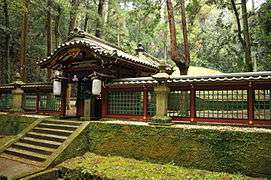 | 34°17′15″N 135°19′04″E / 34.28744537°N 135.31780333°E / 34.28744537; 135.31780333 (Negoroji Precinct) | 3 | |
Misu Haiji Pagoda Site
三栖廃寺塔跡
Misu Haiji tō ato | Tanabe | | | 33°44′14″N 135°25′00″E / 33.73711595°N 135.41653021°E / 33.73711595; 135.41653021 (Misu Haiji Pagoda Site) | 3 | |
Shikagō Ichirizuka
四箇郷一里塚
Shikagō ichirizuka | Wakayama | | | 34°14′42″N 135°12′03″E / 34.24498517°N 135.20078714°E / 34.24498517; 135.20078714 (Shikagō Ichirizuka) | 6 | |
Ueno Haiji Site
上野廃寺跡
Ueno Haiji ato | Wakayama | | | 34°16′29″N 135°15′15″E / 34.27460766°N 135.25430508°E / 34.27460766; 135.25430508 (Ueno Haiji Site) | 3 | |
Shingū Castle Site and Mizuno Clan Graves
新宮城跡附水野家墓所
Shingū-jō ato tsuketari Mizuno-ke bosho | Shingū | | | 33°43′05″N 135°59′08″E / 33.71793361°N 135.98564486°E / 33.71793361; 135.98564486 (Shingū Castle Site and Mizuno Clan Graves) | 2, 7 | |
Nishi Kokubun Pagoda Site
西国分塔跡
Nishi Kokubun tō ato | Iwade | | | 34°15′57″N 135°19′53″E / 34.26596199°N 135.33145028°E / 34.26596199; 135.33145028 (Nishi Kokubun Pagoda Site) | 3 | |
Ōtani Kofun
大谷古墳
Ōtani kofun | Wakayama | | | 34°15′42″N 135°10′35″E / 34.26161825°N 135.17634967°E / 34.26161825; 135.17634967 (Ōtani Kofun) | 1 | |
Niutsuhime Jinja Precinct
丹生都比売神社境内
Nyūtsuhime Jinja keidai | Katsuragi | inscribed on the UNESCO World Heritage List as one of the Sacred Sites and Pilgrimage Routes in the Kii Mountain Range[4][5] |  | 34°15′30″N 135°31′27″E / 34.25833976°N 135.52425715°E / 34.25833976; 135.52425715 (Niutsuhime Jinja Precinct) | 3 | |
Hamaguchi Goryō Grave
浜口梧陵墓
Hamaguchi Goryō no haka | Hirogawa | | | 34°01′16″N 135°10′05″E / 34.02102815°N 135.16814668°E / 34.02102815; 135.16814668 (Hamaguchi Goryō Grave) | 7 | |
Myōe Kishū Sites and Tōba
明恵紀州遺跡率都婆
Myōe Kishū iseki sotsu tōba | Arida, Yuasa, Aridagawa | | | 34°04′18″N 135°09′35″E / 34.07174983°N 135.15972962°E / 34.07174983; 135.15972962 (Myōe Kishū Sites and Tōba) | 3, 7 | |
Narugami Shell Mound
鳴神貝塚
Narugami kaizuka | Wakayama | | | 34°13′50″N 135°12′42″E / 34.23057523°N 135.21179749°E / 34.23057523; 135.21179749 (Narugami Shell Mound) | 1 | |
Wakayama Castle
和歌山城
Wakayama-jō | Wakayama | |  | 34°13′39″N 135°10′16″E / 34.22753836°N 135.17109892°E / 34.22753836; 135.17109892 (Wakayama Castle) | 2 | |
Wakayama Domain Tokugawa Clan Graves
和歌山藩主徳川家墓所
Wakayama-han-shu Tokugawa-ke bosho | Kainan | | | 34°06′32″N 135°10′01″E / 34.10895802°N 135.16707259°E / 34.10895802; 135.16707259 (Wakayama Domain Tokugawa Clan Graves) | 7 | |
Kumano Sanzan
熊野三山
Kumano sanzan | Shingū, Tanabe, Nachikatsuura | designation includes an area of Kihō in Mie Prefecture | 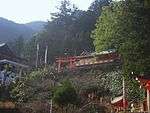 | 33°43′37″N 135°58′55″E / 33.72693148°N 135.98189923°E / 33.72693148; 135.98189923 (Kumano Sanzan) | 3 | |
Ōmine Okugakemichi
大峯奥駈道
Ōmine okugakemichi | Tanabe, Shingū | trail inscribed on the UNESCO World Heritage List as one of the Sacred Sites and Pilgrimage Routes in the Kii Mountain Range;[4][5] designation includes areas of Yoshino, Kurotaki, Kawakami, Tenkawa, Kamikitayama, Shimokitayama, Totsukawa, and Gojō in Nara Prefecture | | 34°13′26″N 135°57′19″E / 34.22400209°N 135.95521982°E / 34.22400209; 135.95521982 (Ōmine Okugakemichi) | 3, 6 | |
Kumano Sankeimichi
熊野参詣道
Kumano sankeimichi | Shingū, Tanabe, Nachikatsuura, Shirahama, Susami, Kōya | trails inscribed on the UNESCO World Heritage List among the Sacred Sites and Pilgrimage Routes in the Kii Mountain Range;[4][5] designation includes the Nakahechi (中辺路), Ōhechi (大辺路), Kohechi (小辺路), Iseji (伊勢路), Kumano River (熊野川), Shichirimi-hama (七里御浜), and Hano-no-Iwa (花の窟) and areas of Nosegawa and Totsukawa in Nara Prefecture and Kumano, Owase, Taiki, Kihoku, Mihama, and Kihō in Mie Prefecture | 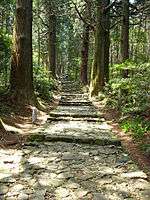 | 33°54′06″N 135°48′11″E / 33.90166772°N 135.80310716°E / 33.90166772; 135.80310716 (Kumano Sankeimichi) | 3, 6 | |
|








